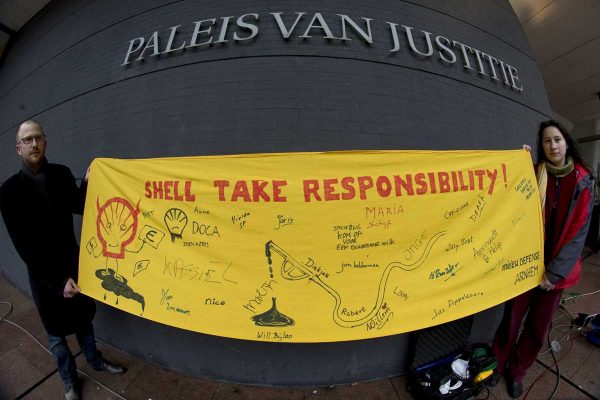
A Dutch court has ordered Shell to compensate Nigerian farmers for oil spills that polluted swathes of their land in the Niger Delta.
After 13 years of legal battles, an appeals court in The Hague ruled that Shell’s Nigerian branch must pay out for leaks on land in two villages.
It also held the Anglo-Dutch parent company, Royal Dutch Shell, liable for installing new pipeline equipment to prevent further devastating spills.
“The court ruled that Shell Nigeria is liable for the damage caused by the spills. Shell Nigeria is sentenced to compensate farmers for damages,” Judge Sierd Schaafsma said.
The court ordered Shell to compensate three out of four farmers who first lodged the case in 2008, saying the amount of damages would be determined later. The case involving the fourth farmer will also be resolved at another time.
The case has dragged on so long that two of the Nigerian farmers have died since it was first filed.
The Dutch arm of environment group Friends of the Earth, which backed the case, said there were “tears of joy” and that “after 13 years, we’ve won.”
“Until this morning, Dutch multinationals could act with impunity in developing countries… and this has changed now,” Donald Pols of Friends of the Earth said outside court.
Shell Nigeria said it was “disappointed” by the verdict.
The farmers sued Shell over pollution in their villages Goi, Oruma and Ikot Ada Udo, in southeastern Nigeria.
At a hearing last year lawyers for the farmers showed gushing and burning oil spills as well as villagers dragging their hands through water sources, their hands streaked with the dark-coloured liquid.
A lower court in the Netherlands found in 2013 that Shell should pay compensation for one leak but that Shell’s parent company could not be held liable in a Dutch court.
But in 2015 the Hague appeals court ruled that Dutch courts did indeed have jurisdiction in the case.
Today, January 29, the court ruled that Shell Nigeria must pay compensation for the leaks at Goi and Oruma.
“In the Oruma cases, Shell Nigeria and… Royal Dutch Shell are ordered to equip the pipeline with a leak detection system so that environmental damage can be limited in the future,” the court said.
Shell Nigeria should have shut down oil supplies on the day of the spill in the cases in Goi, it said.
The court said it needed more time to resolve the case of Ikot Ada Udo.
“We are happy about the ruling. It shows that our people can get justice for the years of devastation of our environment by Shell,” King Emere Godwin Bebe Okpabi, ruler of the Ogale Community in the Niger Delta, told AFP.
A lawyer for the farmers, Channa Samkalden, said outside court it was “fantastic news”.
“My clients have been struggling and waiting for this for a very long time,” Samkalden said.
Shell has always blamed all of the spills on sabotage and said it has cleaned up with due care where pollution has occurred.
“We continue to believe that the spills in Oruma and Goi were the result of sabotage,” Shell in Nigeria said in a statement.
Nigeria was the world’s ninth-largest oil producer in 2018, pumping out volumes valued at some $43.6 billion (37 billion euros), or 3.8 percent of total global production.
In a separate case in the Netherlands, the widows of four Nigerian activists executed by the military regime in the 1990s have accused Shell of complicity in their deaths.






